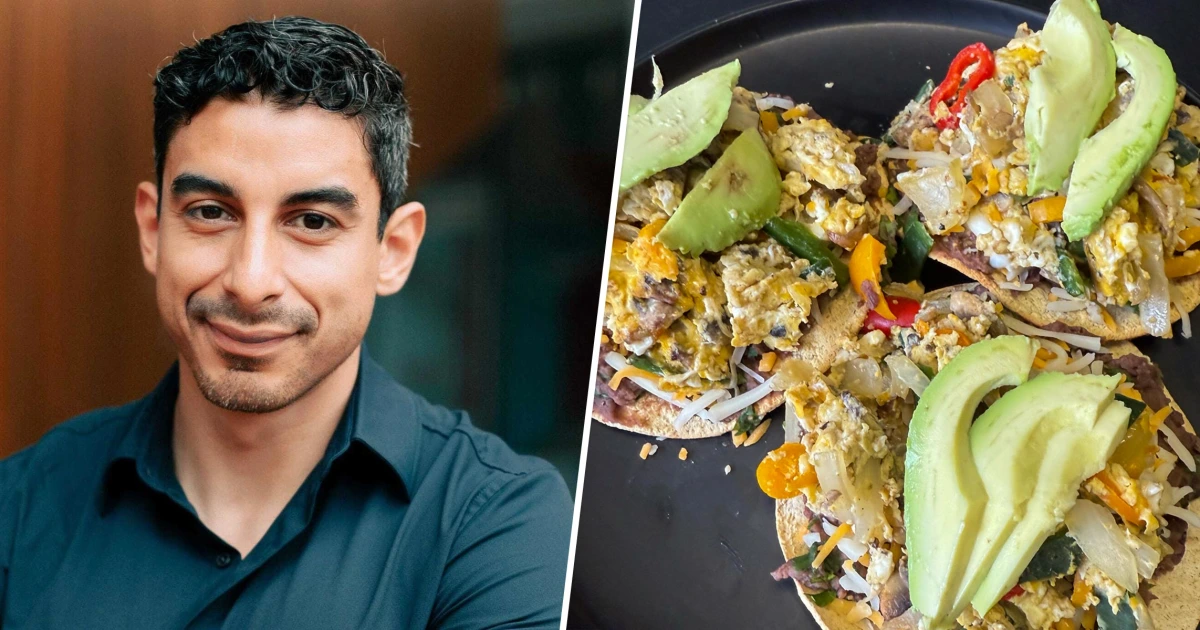
For Adrian Chavez, mealtime isn’t just about feeding his son — it’s about connection, culture and lifelong lessons in health.
The Texas-based nutrition expert and podcast host who has a Ph.D. has made it his mission to help others cut through nutrition misinformation online. But at home, his most important student is his 12-year-old son.
Chavez, who has full custody of his son, has raised him to be an independent and mindful eater. That includes honoring his son’s dietary choices.
“He decided to be a vegetarian when he was, like, 4 years old, and has not eaten meat in about eight years now,” Chavez says. “That does require a little bit of adjustment during mealtime, but we’ve found a rhythm that works for both of us.”
That rhythm starts with a weekly plan. Every Sunday, he sits down with his son to map out their meals for the week. Chavez keeps a whiteboard on the fridge with their dinner schedule and ideas for his son’s school lunches.
“It makes things so much easier for us,” he explains. “We sit down, write down what we’re going to have for dinner each night, and then I make a list from that and go grocery shopping. It takes the stress out of deciding what to eat every day.”
Beyond the logistics, the process has become a way to involve his love for nutrition and good food. “He’s always been involved in the cooking and in food choices, going to the grocery store when he was younger, trying different fruits and vegetables,” Chavez says. “People see what he eats on social media and say, ‘I wish my kid would eat that.’ But it’s really just years of exposure and involvement. He’s found healthy foods that he genuinely enjoys.”
Sharing His Culture Through Food
Chavez’s meals are also a reflection of his Mexican heritage. Growing up surrounded by traditional foods shaped his palate, and now he’s passing that on to his son.
“[My son] goes through different phases, but his primary favorites are Mexican foods,” Chavez says. “That’s probably just because that’s the thing I cook the best.”
Their meals often feature tostadas, tacos, refried beans, sautéed vegetables and chiles rellenos, all dishes rich in flavor, culture and nutrients. While some parents might assume traditional foods need to be “healthified,” Chavez says Mexican cuisine already has a strong nutritional foundation.
“I’m always trying to make every dish I cook healthier; why wouldn’t you?” he says. “But Mexican dishes are already full of healthy foods. They’re made with corn, beans and tons of vegetables.”
He often makes the same base dish for both of them, starting with beans, veggies and spices, including cumin and garlic. Then, he adds turkey or chicken for himself. That way, his son’s vegetarian meals stay true to their shared traditions without feeling restrictive.
Focusing on Nutrition Education, Not Restriction
Chavez’s approach to nutrition education with his son mirrors his philosophy as a nutrition educator online: Keep it simple and positive and lead by example.
“I mostly speak about food in a positive light,” he says. “We focus on the benefits and importance of healthy eating, and I make all the foods that he enjoys, so he doesn’t really associate food with restriction.”
That doesn’t mean desserts or snacks are off-limits. Instead, Chavez uses those moments to teach balance and awareness. “Maybe he wants a food that has 1,500 calories, and I’ll say, ‘You don’t need all of that in one sitting.’ We talk about things like protein and how certain foods make him feel.”
Through these conversations, his son has developed an understanding of nutrition that even surprises adults. “He has more nutrition knowledge than a lot of adults,” Chavez says proudly. “He likes being involved, and that makes a huge difference.”
His Advice For Other Parents
When asked what advice he has for parents hoping to celebrate their culture through food while also fostering healthy habits, Chavez emphasizes that the two aren’t mutually exclusive.
“These two should not be exclusive of one another,” he says. “Cultural foods are typically nutritious and… they shouldn’t be viewed as less healthy than other foods.”
He encourages parents to start by building a basic understanding of nutrition, like how much energy, fiber and protein the body needs. Use that foundation to adapt traditional recipes in a balanced way.
“You can celebrate your heritage and nourish your family at the same time,” he says. “Healthy eating doesn’t mean abandoning your culture. It means honoring it with intention.”
For Chavez, that philosophy has created more than just healthy meals; it’s built a connection with and confidence in his son. “He’s doing everything I hoped he would [with healthy eating],” Chavez reflects. “Because I included him in the process from the beginning.”